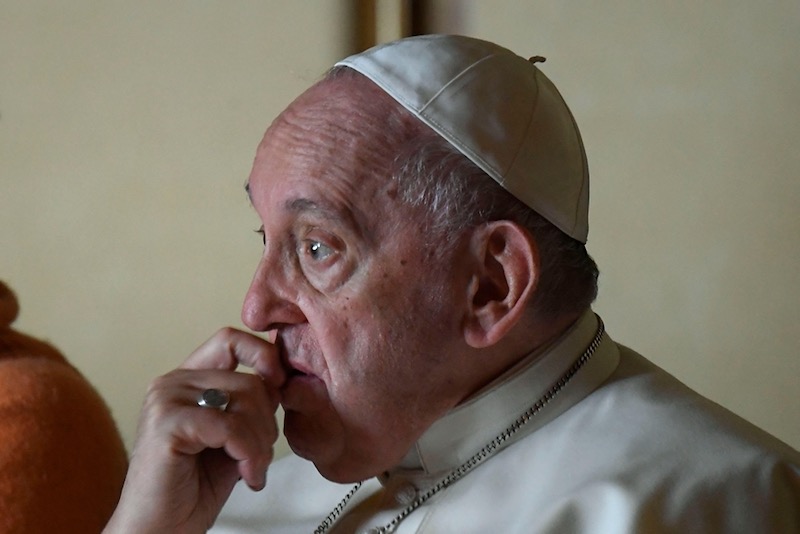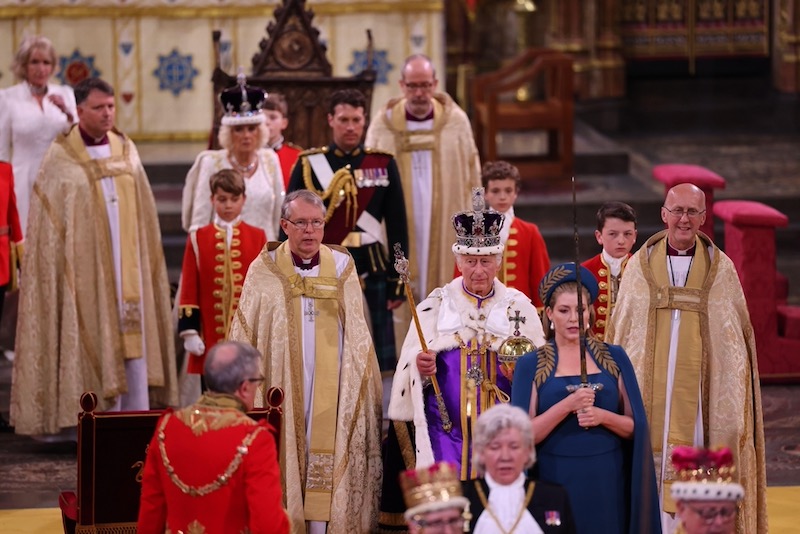Although the Coronation of King Charles III took place within the context of a Church of England religious service the Catholic contribution was substantial, including elements such as relics of the “True Cross” gifted by Pope Francis incorporated into the Cross of Wales which led King Charles III down the aisle of Westminster Abbey at the start.
For the first time in more than 400 years, the Pope was represented – by Secretary of State Cardinal Pietro Parolin and Apostolic Nuncio Archbishop Miguel Maury Buendia. Cardinal Vincent Nichols, Archbishop of Westminster, took part in the service, invoking a blessing on the King. Also present were Archbishop Mark O'Toole of Cardiff, Wales, Bishop Hugh Gilbert of Aberdeen, Scotland, and Archbishop Eamon Martin of Armagh, Primate of All Ireland. The leader of the Irish Church said afterwards he was “honoured” to represent the Catholics of Ireland.
Speaking to The Tablet, Archbishop Martin said a hand was extended to all Christian traditions and people of all faiths in the ceremony and described the coronation of King Charles as “a sacred ceremony” at which he was “honoured” to represent the Catholics of Ireland. Referring to the anointing of the King with sacred oils, Archbishop Eamon Martin said it underlined that this was “for somebody set apart to do God’s will”. He said that what came across in the coronation ceremony was that the King is “called to serve his people, modelling himself on the servant King – Christ himself”.
For centuries, the most senior lay member of the Roman Catholic Church, the Duke of Norfolk, has orchestrated Britain’s Anglican royal events such as the Coronation. Overseeing the whole event last Saturday was the Earl Marshal of England, the 18th Duke of Norfolk, Edward Fitzalan-Howard. As the highest-ranking duke and most senior peer in Britain, he is responsible for arranging the State Opening of Parliament, but it is also his duty to organise sovereigns' state funerals and the accession and coronations of new monarchs. Some in his ancestry have suffered for their Catholic faith. Philip Howard, Earl of Arundel, died at the Tower of London in 1595, accused of being a Catholic and a Jesuit conspirator. He was canonised in 1970 as one of the Forty Martyrs of England and Wales.
Conservative MP Penny Mordaunt, who has Irish Catholic roots and attended a Catholic secondary school near Portsmouth, played a standout role as the Lord President of the Privy Council. She carried the 17th century Sword of State made for Charles II into Westminster Abbey, and exchanged it for the Jewelled Sword of Offering, which she delivered to the archbishop. She then carried this sword, with hilt encrusted with diamonds, rubies and emeralds, for the rest of the service and walked with it in front of the King as he left the abbey. She was the first woman to undertake this role, which symbolises royal power and the King accepting his duty and knightly virtues.
During the service the choir sang a new Sanctus by contemporary British composer and Catholic Roxanna Panufnik, one of the King’s 12 commissions for the coronation.
Dioceses of England and Wales held Cathedral Masses and hosted coronation events last weekend. On the Sunday these included Cardinal Vincent Nichols celebrating Mass with prayers offered for the King and Archbishop John Wilson celebrating a Mass of Thanksgiving for the Coronation in Southwark. Nottingham Cathedral hosted a “God save the King!” concert.
However, some Christians questioned aspects of the Coronation and criticised the police crackdown on protestors in Central London. On the website Ekklesia, which has its roots in Christian social thought, director Simon Barrow wrote that he would be declining to make the public oath of allegiance. He said, “Instead, alongside friends within and without the fraternity of Christian believers, we may take the opportunity to commit ourselves afresh to the struggle for peace with justice, healing for the planet and its peoples, and a changed relationship to power that generates an economy and politics of sharing instead of hoarding, and mutuality in place of deference.”



 Loading ...
Loading ...